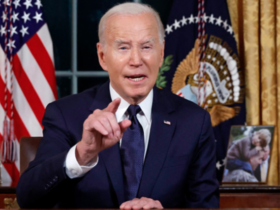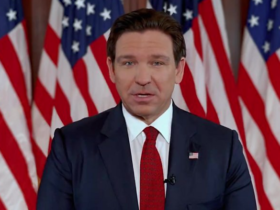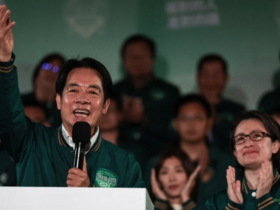Donald Trump has appealed the decision by Maine’s top election official to remove him from the ballot in the 2024 presidential election.
Mr Trump, the current Republican frontrunner, asked that a state court overturn the move by Maine Secretary of State Shenna Bellows.
Ms Bellows has previously defended her decision by saying she has a “sacred obligation” to uphold the law.
The former US president has also been removed from the ballot in Colorado.
Mr Trump was removed from the Maine and Colorado ballots by challenges that cited the US constitution’s insurrection clause and his alleged incitement of the 2021 US Capitol riot.
The 14th Amendment of the US Constitution bans anyone whom has “engaged in insurrection or rebellion” from holding federal office.
In Monday’s court filing regarding the Maine decision, Mr Trump’s attorneys write that Ms Bellows – a Democrat – was a “biased decision maker” without the legal authority to remove him from the ballot.
Additionally, the filing accuses Ms Bellows of making “multiple errors of law” and acting “in an arbitrary and capricious manner”.
“President Trump will be illegally excluded from the ballot as a result of the Secretary’s actions,” the filing says.
Ms Bellows, a former state senator and executive director of Maine’s American Civil Liberties Union, was elected to serve as Maine’s Secretary of State in December 2020. A group of current and former state lawmakers challenged Mr Trump’s place on the ballot, which Maine law required Ms Bellows to rule on.
Several lawsuits in other states – such as Michigan and Minnesota – that are similar to the Maine objection have been rejected in court.
The US Supreme Court is expected to take up the issue raised in Maine and Colorado, which will not take effect until the legal challenges are settled. A ruling by the court on Mr Trump’s eligibility would be applied nationwide.
David Janovksy, a senior policy analyst at the Project on Government Oversight, an independent watchdog, said that “whichever way the Supreme Court rules is the best outcome”.
“The fact that we now have two states in Colorado and Maine that have made this determination against the backdrop of other states that have declined to go that far means that if there was ever a case for the Supreme Court to resolve, this would be it,” he said.
“Time is of the essence now that we’re in an election year,” Mr Janovsky added
In an interview with the BBC last week, Ms Bellows defended her actions and said she hoped that the matter would ultimately be settled by the Supreme Court.
She said that she was “mindful” that no other secretary of state in US history had removed a presidential candidate due to the insurrection clause.
“But I’m also mindful that no presidential candidate has, ever before, engaged in insurrection,” Ms Bellows said.
She also denied that her decision was in any way politically motivated, instead arguing that it was “thorough and based on the rule of law”.
Both Mr Trump and his campaign have repeatedly decried the rulings from Maine and Colorado as politically motivated and intended to harm his chances of winning the 2024 election.
In addition to the legal wrangling over his eligibility in the election, Mr Trump is facing trials in federal court and in Georgia stemming from his attempts to overturn his 2020 election loss to Democrat Joe Biden.
He has not been charged with inciting insurrection in either of the two cases.
In a separate case on Tuesday, a federal judge in Washington DC ruled that part of a lawsuit against Mr Trump stemming from the death of a police officer at the 6 January riot can go ahead.
In the lawsuit, Sandra Garza – the wife of Capitol Police officer Brian Sicknick – sued Mr Trump and two participants in the riot over his death.












Leave a Reply